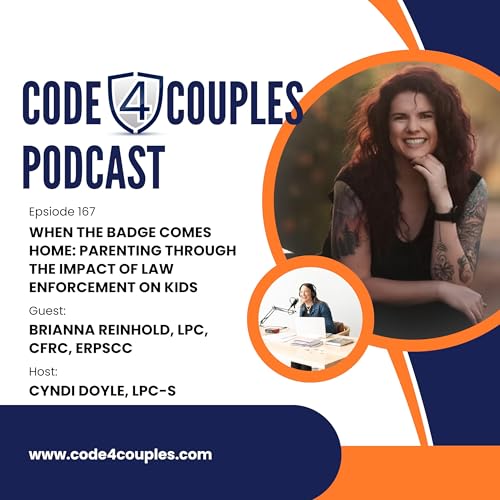Conflict hits differently in law enforcement families. Hypervigilance, shift work, emotional shutdown, and missed holidays can slowly chip away at connection. Jimmy and Angie Cash know that firsthand. Their story includes a blended family, years of slow disconnect, a marriage crash, separation, and a complete rebuild that now helps thousands of first responder couples.
In this conversation, Jimmy and Angie walk through how their marriage drifted into resentment and distance, how hypervigilance affected connection, how unmet needs kept getting misread as criticism, and the major crash that forced them to reassess everything.
They share the exact skills, mindset shifts, and conflict resolution tools that helped them repair emotional intimacy, communicate safely, and build a stronger marriage than ever.Law enforcement relationships face unique pressure. High-alert brains, sleep disruption, trauma exposure, blended family stress, and "there is no good time to talk about it" patterns create slow relational erosion.
This episode shows that a marriage can come back from resentment, distance, and even separation when couples have the right skills and support.
KEY TOPICS COVERED
✓ Hypervigilance and emotional withdrawal at home
✓ The drift into resentment in first responder marriages
✓ How unmet needs hide inside everyday complaints
✓ The role of repentance, repair, and ownership in rebuilding trust
✓ How to de-weaponize conflict conversations
✓ Skills that help couples listen, connect, and repair
✓ Why couples wait an average of seven years to ask for help
✓ Daily practices that rebuild emotional intimacy
WHO THIS EPISODE IS FOR
• Law enforcement spouses and partners
• First responder couples navigating distance or disconnection
• Officers who feel numb, overwhelmed, or checked out
• Couples recovering from betrayal or crisis
• Anyone wanting practical tools to reconnect, communicate, and repair
Read the book that has helped thousands of first responder couples:
Hold the Line: The Essential Guide to Protecting Your Law Enforcement Relationship
https://www.amazon.com/Hold-Line-Protecting-Enforcement-Relationship-ebook/dp/B08TPRTY9G#customerReviews
Bring Code4Couples training to your department:
https://code4couples.com/training/
00:00 Welcome and introduction
01:00 Jimmy and Angie's origin story
03:00 Blended family dynamics
07:00 Shift work, missed holidays, and slow disconnection
10:00 Emotional intimacy vs physical intimacy
12:30 Hypervigilance and the home fallout
14:00 Brotherhood, secrecy, and resentment
16:00 "We were good until we weren't"
18:00 The crash and separation
20:00 Live the Life: the turning point
22:00 Unmet needs and how couples misread them
25:00 How officers can hear "we need help" differently
28:00 The emotional adult vs the emotional teenager
29:00 Repentance, repair, and genuine ownership
32:00 The shift that rebuilt their marriage
34:00 "Taking Out the Trash" emotional processing tool
36:30 How to handle conflict when there's "no good time"
39:00 The dangerous drift into disconnection
41:00 Live the Life programs and Hope Weekend
44:00 Final encouragement for first responder couples
 29 m
29 m 47 m
47 m 52 m
52 m Oct 30 202541 m
Oct 30 202541 m Oct 16 202536 m
Oct 16 202536 m 44 m
44 m Sep 18 202541 m
Sep 18 202541 m 39 m
39 m
